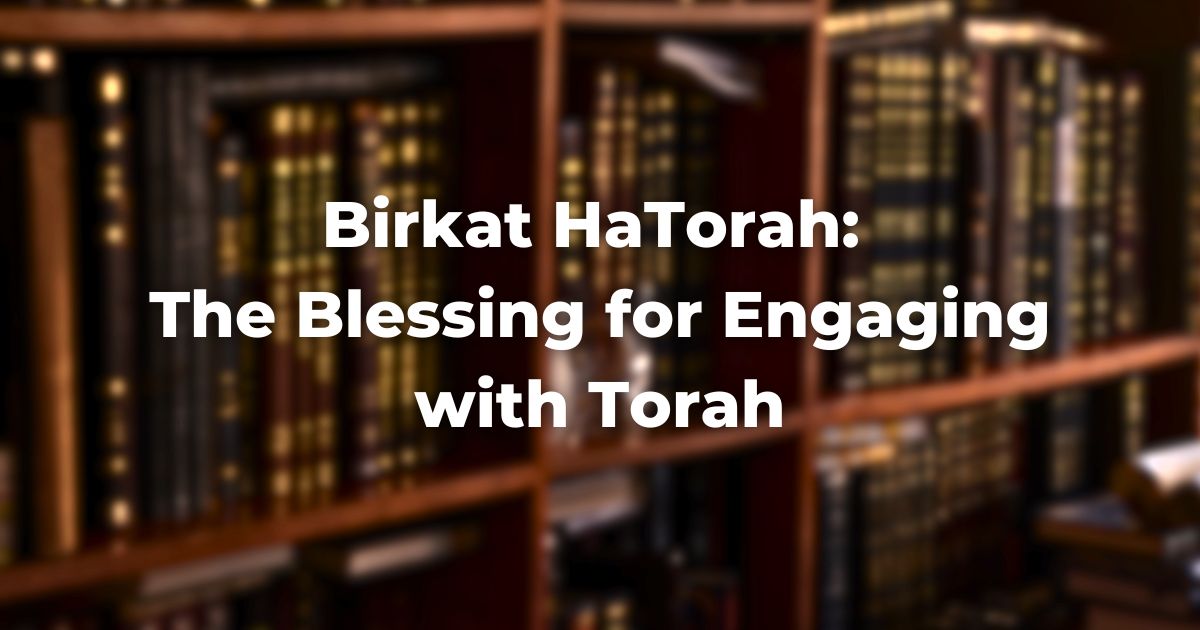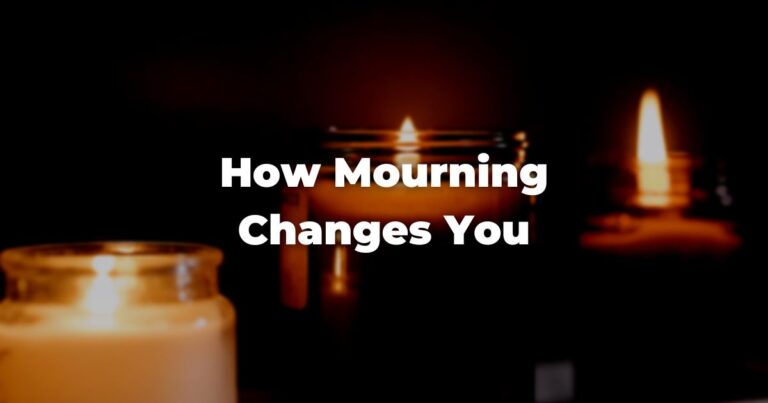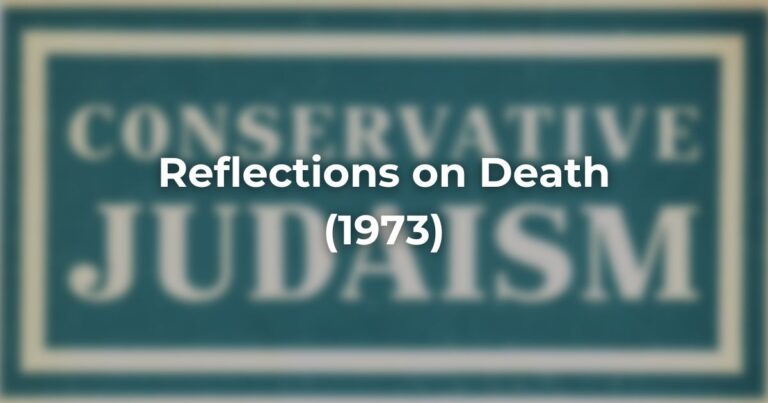Before beginning TorahRefers to the first five books of the Hebrew Bible, the Tanakh, also called the Five Books of Moses, Pentateuch or the Hebrew equivalent, Humash. This is also called the Written Torah. The term may also refer to teachings that expound on Jewish tradition. Read more study, Jewish tradition teaches us to recite a series of blessings known as Birkat HaTorah.
These blessings express gratitude for the gift of Torah and recognize that Torah study is not only an intellectual pursuit but a spiritual practice that connects us to God, to our people, and the unfolding of sacred life.
Reciting Birkat HaTorah each morning acknowledges that engaging with Torah is a covenantal act. It reminds us that study itself is a form of sacred service and that learning is meant to shape how we live, not just what we know.
Birkat HaTorah is a part of the morning service, Shacharit, and appears near the beginning of the daily blessings.
It is common to recite only the first part of the blessing immediately before study.
The third part of the blessing, which thanks God for giving the Torah, is recited when someone is called up for an aliyah to the Torah during synagogue services.
The Blessings
Blessing 1:
בָּרוּךְ אַתָּה ה׳ אֱלֹהֵֽינוּ מֶֽלֶךְ הָעוֹלָם אֲשֶׁר קִדְּ֒שָֽׁנוּ בְּמִצְוֹתָיו וְצִוָּנוּ לַעֲסֹק בְּדִבְרֵי תוֹרָה.
Barukh atah Adonai eloheinu melekh ha-olam, asher kid’shanu b’mitzvota v’tzivanu la-asok b’divrei torah.
Barukh atah Adonai, our God, sovereign of time and space, who has provided us with a path to holiness through the observance of mitzvot and has instructed us to engage with the words of Torah.
Blessing 2:
וְהַעֲרֶב–נָא ה׳ אֱלֹהֵֽינוּ אֶת־דִּבְרֵי תוֹרָתְךָ בְּפִֽינוּ וּבְפִי עַמְּךָ בֵּית יִשְׂרָאֵל. וְנִהְיֶה אֲנַֽחְנוּ וְצֶאֱצָאֵֽינוּ וְצֶאֱצָאֵי עַמְּךָ בֵּית יִשְׂרָאֵל כֻּלָּֽנוּ יוֹדְעֵי שְׁמֶֽךָ וְלוֹמְדֵי תוֹרָתֶֽךָ לִשְׁמָהּ. בָּרוּךְ אַתָּה ה׳ הַמְלַמֵּד תּוֹרָה לְעַמּוֹ יִשְׂרָאֵל.
V’ha’arev-na Adonai eloheinu et-divrei Torat-kha b’finu uv’fi ‘amkha beit Israel. V’nih’yeh anachnu v’tze’e’tza’einu v’tze’e’tza’ei ‘amkha beit Israel kolanu yod’ei sh’mekha v’lomdei toratekha lishmah. Barukh atah Adonai, ha-m’lamed torah l’amo Israel.
May You make the words of Your Torah sweet in our mouths and in the mouths of the house of Israel, Your people, so that we, our children, and all the children of the house of Israel may come to know Your name and study Torah for its own sake. Barukh atah Adonai, who teaches Torah to Your people Israel.
Blessing 3:
בָּרוּךְ אַתָּה ה׳ אֱלֹהֵֽינוּ מֶֽלֶךְ הָעוֹלָם אֲשֶׁר בָּֽחַר בָּֽנוּ מִכָּל הָעַמִּים וְנָֽתַן לָֽנוּ אֶת־תּוֹרָתוֹ: בָּרוּךְ אַתָּה ה׳ נוֹתֵן הַתּוֹרָה.
Barukh atah Adonai eloheinu melekh ha-olam, asher bahar banu mikol ha-amim, v’natan lanu et torato. Barukh atah Adonai, noten ha-torah.
Barukh atah Adonai, our God, sovereign of time and space, who has chosen us from among all peoples, giving us the Torah.
The Deeper Meaning of the Blessings
The First Part of the Blessing – La-asok B’divrei Torah
The first blessing is not phrased “to learn Torah,” as if Torah were something fixed that one could acquire. When we “engage” with Torah we become active participants: querying it, drawing out its implications, and incorporating its teachings into our lives.
The Second Part of the Blessing
The blessing uses the phrase, “yod’ei sh’mecha,” meaning, “to know God’s name” which reminds us that when we invoke God’s name, we are acting in a holy way—justly, compassionately, truthfully.
Passages of Study
Following the recitation of the blessings, it is customary to engage immediately with words of Torah. Generally, blessings should be immediately followed by the relevant mitzvah, in this case Torah study.
The passages selected usually include examples from three foundational categories of Jewish learning: Scripture (Mikra), MishnahA collection of rabbinic teachings edited in Israel around 225 CE. Organized in six sedaraim by subject matter and dealing with both ritual and civil law. Both the Jerusalem and Babylonian Talmud are expansive discussions of the Mishnah. Read more, and TalmudReferring to one of two collections, the Jerusalem and Babylonian Talmuds, edited in the 6th century, that contains hundreds of years of commentary, discussion, and exploration of the ideas in the Mishnah. One could describe it as Mishnah + Gemara = Talmud Read more (GemaraThe discussion portions of the Talmud based on the quoted Mishnah. Read more). Together, they reflect the layered and ongoing relationship between Written and Oral Torah.
Passages of Study
Torah (Numbers 6:24–26):
May Adonai bless you and protect you.
May Adonai’s countenance shine upon you and may Adonai bestow kindness upon you.
May Adonai’s countenance be lifted toward you and may Adonai grant you peace.
Mishnah (Peah 1:1):
These are the deeds for which there is no prescribed measure: leaving the produce at the corner of a field for the poor, offering the gift of first fruits to the Temple, pilgrimage offerings on the three festivals, deeds of kindness and love, and the study of Torah.
Talmud (Kiddushin 39b):
These are the deeds that yield immediate fruit and continue to yield fruit in time to come: honoring parents; performing deeds of kindness and love; attending the house of study morning and evening; providing hospitality; visiting the sick; helping the needy bride; attending the dead; probing the meaning of prayer; making peace between one person and another; and between loving partners. And the study of Torah is the most basic of them all.
If you read the blessing at the top of the page, and you read these passages of study, then you have fulfilled the mitzvah! Yes, really, just this minute!
What to learn more?
Check these out:
Author
-

Exploring Judaism is the digital home for Conservative/Masorti Judaism, embracing the beauty and complexity of Judaism, and our personal search for meaning, learning, and connecting. Our goal is to create content based on three core framing: Meaning-Making (Why?), Practical Living (How?), and Explainers (What?).
View all posts




